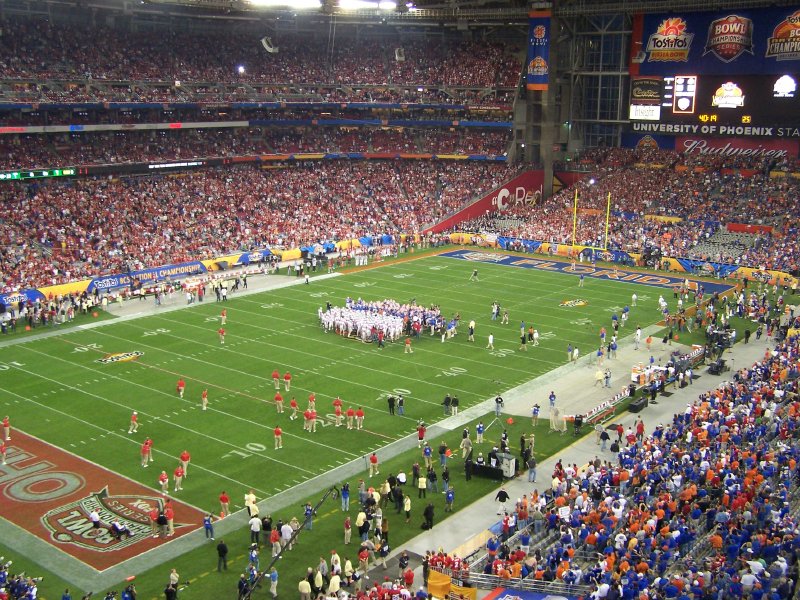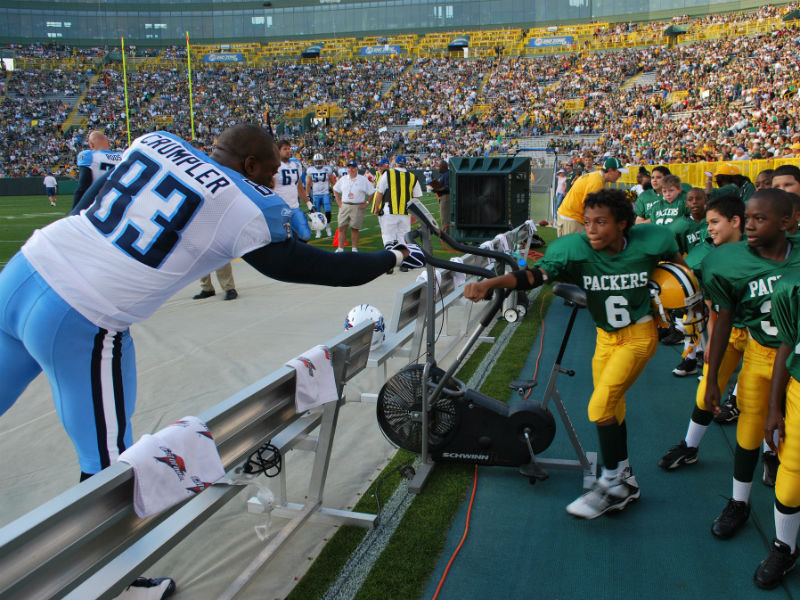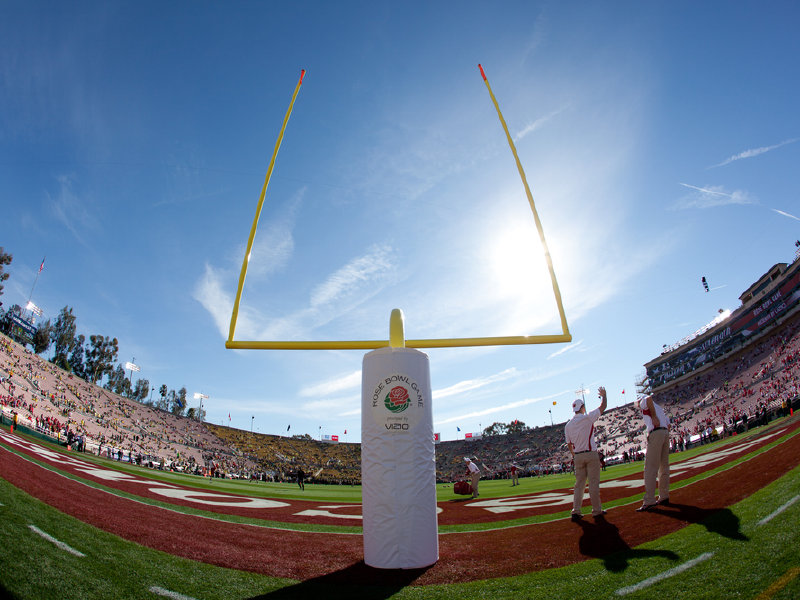It was a day that college football fans had longed for ever since the controversial Bowl Championship Series was rolled out in 1998.
The BCS, the architects of the plan argued, would always pit the No. 1 and No. 2 teams against each other to determine the national champion. In theory, this sounded like a great plan. After all, with the archaic Bowl Coalition, this was almost never accomplished.
"It's a best of both worlds result that capture the excitement of the playoff while keeping the best regular season in sports and the tradition of the bowls," according to Virginia Tech president Charles Steger on Tuesday. Steger and his colleagues on the BCS oversight committee announced that beginning in 2014, college football will finally have a four-team seeded playoff using two bowl games rotated between six sites, culminating in a true national championship game.
Of course, this common sense announcement wasn't that hard to come up with. All anyone had to do was open up their eyes to know that college football's postseason was broken. But lest anyone think that the BCS was the worst thing that ever happened to the game (aside from the rampant corruption and intelligence insulting lies that tried to justify its existence), choosing the national champion actually used to be even more nonsensical.
In 1990, Colorado and Georgia Tech split the national championship because while the Buffaloes were obligated to represent the Big Eight in the Orange Bowl, the Yellow Jackets were forced to represent the ACC in the Florida Citrus Bowl.
The very next season, Miami and Washington shared the national championship. The Hurricanes were obligated to play in the Orange Bowl while the Huskies were contractually forced to play in the Rose Bowl.
In 1994, Nebraska won the national championship even though Penn State was also undefeated.
After the 1994 season, the Bowl Coalition (which did not include the Pac-10 and the Big Ten conferences because of their long-standing ties to the Rose Bowl) was dismantled in favor of the Bowl Alliance.
Of course, the Bowl Alliance was no better, producing a split national championship between Nebraska and Michigan in 1997. In fact, only nine times in the 35 years between 1963 and 1997 did the No. 1 and No. 2 team meet in a bowl game. The vast majority of those times it was purely on accident.
This stroll down memory lane is tedious but important because the notion that the BCS is the worst blight to ever hit organized athletics is a total fallacy. The fact of the matter is that until the BCS was created, chaos reigned all over the college football world.
Enter Roy Kramer.
The grandfatherly native of the Eastern Tennessee town of Maryville, Kramer created a way for most of the bowl games to remain intact, but to advance the game beyond having split national champions year after year.
For the first time, there would be a true national championship game. For the first time, the Big Ten and Pac-10 were on board, irrespective of their New Year's Day Pasadena ties.
But while the BCS always accomplished its promised goal of No. 1 and No. 2, the mechanisms to achieving that led to more controversies than anyone could have imagined. In addition, even the contests within the BCS not designated as that season's title game were overrun by controversy.
In 1998, Kansas State, the No. 3 team in the final BCS standings had to play in the Alamo Bowl while lesser ranked Ohio State and Florida both played in the BCS.
Two seasons later, Florida State leapfrogged over Miami for the right to play in the championship game despite the Seminoles losing head-to-head to the Hurricanes in the regular season. Both teams finished with one loss, and Miami finished No. 2 in the human polls.
The humans were overruled by the computers.
To even further complicate matters, Miami's one loss came to another one-loss team, Washington. In reality, there were three teams with a legitimate claim on No. 2 at the end of the regular season.
In 2001, Nebraska advanced to the national championship game despite not even winning their own division, much less their own conference. Again, the human polls, which ranked the Cornhuskers No. 4, were "corrected" by the computers.
The fact of the matter is that almost every year, there was a controversy as to who the true No. 2 team in the country was. And despite Kramer's best efforts to never see a split national champion that is exactly what happened in 2003 when LSU won the BCS title and upstart USC was crowned the best team in the land by the Associated Press.
Of course, the next year was the one where there were no fewer than five regular season undefeated teams in Division 1-A to choose from, but you get where I am going with this.
Nevertheless, despite year after year of controversy, the lords of the game resisted the public outcry for what we all saw as a simple playoff solution.
As is the case with most decisions that seemingly make little to no sense, to get to the heart of the matter all you really have to do is follow the money trail. In this case, with the massive sums of cash the networks, first ABC, then FOX, and then finally ESPN were doling out for the broadcast rights, the school presidents of the BCS conferences had a monopoly they did not want to share.
Backdoor deals and million dollar handshakes ran rampant throughout the history of the BCS. Cronyism not only was tolerated, it was outright celebrated. Just ask former Fiesta Bowl chairman John Junker, who lavished millions of dollars on those that certified the game as worthy of the BCS happy.
Never mind that an additional playoff would undoubtedly produce more revenue, not less. How ostensibly intelligent men failed to realize this is beyond recognition, but I believe it may have something to do with their ties being tied too tightly, cutting off the circulation of air and blood to their brains.
Still, the university leaders came up with the most ridiculous excuses imaginable. They said did not want to expose their student-athletes to further injury with an additional game. That was a lie, exposed in 2006 when the NCAA allowed teams to add a 12th game to their schedules.
Rick Baker is the president of the Cotton Bowl. Less than two years ago, he stated that "a playoff system would ruin AT&T Cotton Bowl Classic," ever wary to plug his title sponsor.
Tuesday, Baker said "It's a great day for college football. We congratulate the conference commissioners and presidents for their diligent work to enhance the postseason."
Huh?
School and conference leaders repeatedly stated that they did not want their student-athletes missing any further class time with an extra game to prepare for. Of course, the number of schools in the NCAA that have class during the first week of January is so infinitesimally small that we all took turns laughing about that one.
Besides, every other division of NCAA football, as our friends in Whitewater know all too well, features about a month of playoff games. How their academics are somehow less important to university presidents than those in the Football Bowl Subdivision (FBS) escapes logic and reasoning. Of course, the presidents never even mentioned that little basketball tournament in March that takes, well, March to play.
The fact of the matter is that the lords of the game were just trying to save their phony baloney jobs, and with it the millions of dollars they were able to keep to themselves.
So now we have what college football fans have been clamoring for. And while there may be some initial grumbling in the rare years in where there may be a case for more than four teams that have a legitimate stake in a national championship playoff, those instances will be few and far between.
Without the BCS payday and perceived prestige looming over college football, Michigan State's relegation to the Capitol One Bowl after beating arch rival Michigan and their nonsensical berth in the Sugar Bowl this past year would be a moot point. Alabama's inclusion in the national championship game in January over an arguably more deserving Oklahoma State squad would be decided on the field, not by a computer churning out algorithms.
Is the new system, whatever they ultimately call it, perfect? No, but neither is the NFL playoffs. Remember, the Packers only got into the postseason in 2010 based on tiebreakers with both New York and Tampa Bay. All three teams had 10-6 records, but Green Bay's "strength of victory" was the strongest among them.
As they say, the rest is history.
Doug Russell has been covering Milwaukee and Wisconsin sports for over 20 years on radio, television, magazines, and now at OnMilwaukee.com.
Over the course of his career, the Edward R. Murrow Award winner and Emmy nominee has covered the Packers in Super Bowls XXXI, XXXII and XLV, traveled to Pasadena with the Badgers for Rose Bowls, been to the Final Four with Marquette, and saw first-hand the entire Brewers playoff runs in 2008 and 2011. Doug has also covered The Masters, several PGA Championships, MLB All-Star Games, and Kentucky Derbys; the Davis Cup, the U.S. Open, and the Sugar Bowl, along with NCAA football and basketball conference championships, and for that matter just about anything else that involves a field (or court, or rink) of play.
Doug was a sports reporter and host at WTMJ-AM radio from 1996-2000, before taking his radio skills to national syndication at Sporting News Radio from 2000-2007. From 2007-2011, he hosted his own morning radio sports show back here in Milwaukee, before returning to the national scene at Yahoo! Sports Radio last July. Doug's written work has also been featured in The Sporting News, Milwaukee Magazine, Inside Wisconsin Sports, and Brewers GameDay.
Doug and his wife, Erika, split their time between their residences in Pewaukee and Houston, TX.







